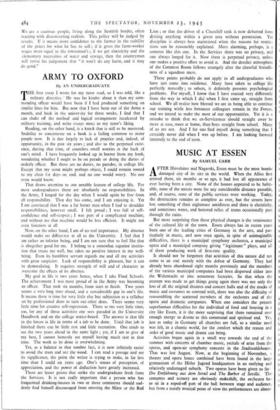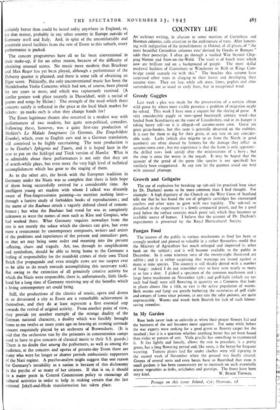MUSIC AT ESSEN
By SAMUEL CARR
AFTER Hiroshima and Nagasaki, Essen must be the most bomb. damaged city of its size in the world. When the Allies first arrived there, six months or so ago, it had lost all appearance of ever having been a city. None of the houses appeared to be habit- able, none of the streets were for any considerable distance passable, and, of course, none of the public services were working. Today, the destruction remains as complete as ever, but the streets have lost something of their nightmare untidiness and there is electricity, and sometimes water, and battered relics of trams occasionally pass through the ruins.
But more surprising than these physical changes is the renaissance of the cultural life of the town. Essen always has in recent years been one of the leading cities of Germany in the arts, and par- ticularly in music, and now once again, in spite of unimaginable difficulties, there is a municipal symphony orchestra, a municipal opera and a municipal company giving " legitimate " plays, and all of them producing work of first-rate quality.
It should not be forgotten that activities of this nature did not
come to an end merely with the defeat of Germany. They had already been abandoned eight months previously and the members of the various municipal companies had been dispersed either into the Wehrmacht or into armament factories. So that when the attempt was made to get things going again there was not only the loss of all the original theatres and concert halls and of the stocks of music and costumes to contend with, there was also the difficulty of reassembling the scattered members of the orchestra and of the opera and dramatic companies. When one considers the present superhuman difficulties for the individual of food and housing in a city like Essen, it is the more surprising that there remained over enough energy to devote to this communal and spiritual end. Yet, just as today in Germany all churches are full, so a similar need was felt, in a chaotic world, for the comfort which the reason and order of good music and drama can bring.
Activities began again in a small way towards the end of the summer with concerts of chamber music, recitals of arias from the operas, and open-air symphony concerts in the Stadtwaldtheater. That was last August. Now, at the beginning of November, a theatre and opera house combined have been found in the large gymnasium of the Hitler Jugend headquarters in an outlying and relatively undamaged suburb. Two operas have been given so far: Die Entfiihrung aus dem Serail and The Barber of Seville: The costumes and scenery are obviously makeshift, the orchestra has to sit in a roped-off part of the hall between stage and audience, but from a purely musical point of view the performances are almost
certainly better than could be heard today anywhere in England, or, for that matter, probably in any other country in Europe outside of Germany itself and Italy. And, in spite of the uncomfortable and uncertain travel facilities from the rest of Essen to this suburb, every performance is packed.
The concert programmes have all so far been conventional in their make-up, if for no other reason, because of the difficulty of obtaining unusual scores. No music more modern than Bruckner and Max Reger has yet been played, although a performance of the Debussy quartet is planned, and there is some talk of obtaining an Elgar score. Politically, the only unconventional music has been the Mendelssohn Violin Concerto, which had not, of course, been played for ten' years or more, and which was rapturously received. (A similar gesture took place recently in Dusseldorf, with a recital of poems and songs by Heine.) The strength of the need.which these concerts satisfy is reflected in the price at the local black market for tickets: 5o marks each is what they change hands for!
The Essen legitimate theatre also restarted in a modest way with performances of two modern, but quite non-political, comedies. Following these, however, was a quite first-rate production of Moliere's Le Malade Imaginaire (in German, Die Eingebildete Kranke), which, even to English ears and in a German translation, still contrived to be highly entertaining. The next production is to be Goethe's Iphigenie auf Tauris, and it is hoped later in the year to put on the Schlegel and Tieck version of Hamlet. What is so admirable about these performances is not only that they are of worth-while plays, but even more the very high level of technical accomplishment which has gone to the staging of them.
As to the other arts, the break with the European tradition in Germany under the Nazis was so complete that there is little hope of them being successfully revived for a considerable time. An intelligent young art student with whom I talked was distantly aware of Post-Impressionist painting—to mention nothing later— through a furtive study of forbidden books of reproductions ; and the name of the Bauhaus struck a vaguely defined chord of remem- brance ; but what the Bauhaus had stood for was as completely unknown as were the names of men such as Klee and Gropius, who had worked there. What Germany requires nowadays from the arts is not merely the solace which the classics can give, but even more a restatement by contemporary composers, writers and artists of the problems and experiences of the present and immediate past, so that art may bring some 'order and meaning into the present suffering, chaos and tragedy. Art, too, through its simplification and symbolism, should be able to bring home to the Germans a feeling of responsibility for the manifold crimes of their own Third Reich (for propaganda and even straight news are too suspect ever to be able to do much towards accomplishing this necessary task). But owing to the extinction of all genuinely creative activity for which the Nazis were responsible, there is, unfortunately, little likeli- hood for a long time of Germany receiving any of the benefits which a living contemporary art could bring.
Still, the productions of the classics of music, opera and drama in so devastated a city as Essen are a remarkable achievement in themselves, and they do at least represent a first essential step towards the revival of original activity. From another point of view, they provide yet another example of the strange duality of the German national character, a duality which was forcibly brought home to me twelve or more years ago on hearing an evening serenade concert exquisitely played by an orchestra of Brownshu-ts. (It is said that the orchestras run by the prisoners in concentration camps used to have to give concerts of classical music to their S.S. guards.) There is no doubt that among the performers, as well as among the audience, at the concerts and operas of present-day Essen there are many who were for longer or shorter periods enthusiastic supporters of the Nazi regime. A psycho-analyst might suggest that one reason for Germany's instability as a nation is because of this dichotomy in the psyche of so many of her citizens. If that is so, it should be a major point in Control Commission policy to encourage all cultural activities in order to help in making certain that the last national Jekyll-and-Hyde transformation has taken place.



























 Previous page
Previous page